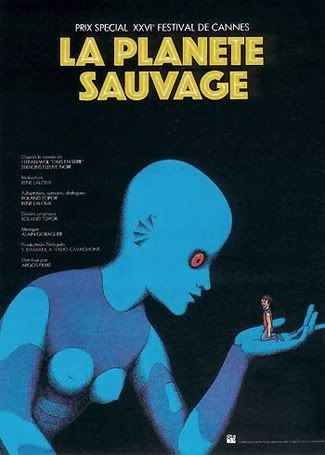
I always speak of serendipity. An unexpected lesson, falling in your lap, is a prized possession. I found Rene Laloux’s “Fantastic Planet” sifting through the shelves at Brandon Florida’s Regional Library. I selected the title because the box looked cool—being honest. But the day after my viewing this gorgeous piece of anime, its themes of knowledge and survival would take root.
Unexpectedly, My brother called, and we stumbled in to friendly but intense argument relevant to “Fantastic Planet.” With his request, I played the intro to Dead Prez’s album “Let’s get Free.” (Don’t Start) A strong voice spoke of a wolf, lured and caught by a knife lodged into a block of ice. After continuously licking the blade, the wolf, attempting to fill his hunger, dies from his insatiable taste for blood. My brothers argument was interesting: Because some men, like the wolf, are caught in the moment, living for Today’s hunger, and because they're faced with feeding a family or themselves, this person can not be told there is a better means for survival, simply because this individual is absorbed by what they feel is the right choice.
I didn’t agree. However, in many ways, I later killed my own argument. I mentioned the freedom of knowledge. As in the film “Fantastic Planet,” the domesticated humans were only set free with the understanding of the Draag's Alien language and knowledge of their science.
“There is a better way, I professed.” They're so many routes a person can take beside drugs.”
I also added, that African-American’s experienced slavery, reconstruction and Jim Crow, and didn’t resort to killing and drugs. He agreed. However, he countered with the variables that flourish in an ever-changing world: technology and the sensationalism of material. He asserts, African Americans, in latter time periods didn’t worry about cars and flashy material, it didn’t exist. I agree with this. I feel previous generations, had they been exposed to modern day perils of cars and money, they too, speaking generally, would have taken to the same rusty blade lodged in the block of ice.
The killer of my argument was my mentioning Malcolm X. “Think about Malcolm, I said. He would also agree there is a better way. But I quickly paused. For I know as well as any one else, after researching one of the most interesting men of twentieth century, no one could have told Malcolm little what to do during his time of the streets. To learn a lesson, Malcolm had to hit rock bottom. I looked at my own life. I had never been street person but this doctrine held true. I have said in the past, its easy for privileged people, like myself write off someone egregiously—yet done so subconsciously—tearing down a man or woman's choices without understanding their motivation. I can feel people sneering at this statement. But can you only take credit for a your positive influences.
Furthermore, can you call a person a "Star?" (Something capable of creating its own light) Though, I still feel knowledge is freedom. What does it take to give a man the “sober mind?” Can a man find his lane before prison or even worst death? I had disagreed with my brother’s argument, but had been agreeing with it all along. And I’ve reaffirmed my stance: I can’t judge a man; rather I must take the time to understand him. As for the freedom of the human race, I wish I knew the best course of action.
Obtaining these “quixotic” ideals is nothing like in the movies. However this Sci-Fi classic offers a wonderful solution: To be free, one must arm his self with knowledge. However, I love how the story opens the door for intelligent creatures need for superiority. Maybe this is just my interpretation, but there's a subtle scene that had me—the hugest advocate for brotherhood—watching with a sardonic smile.
No comments:
Post a Comment